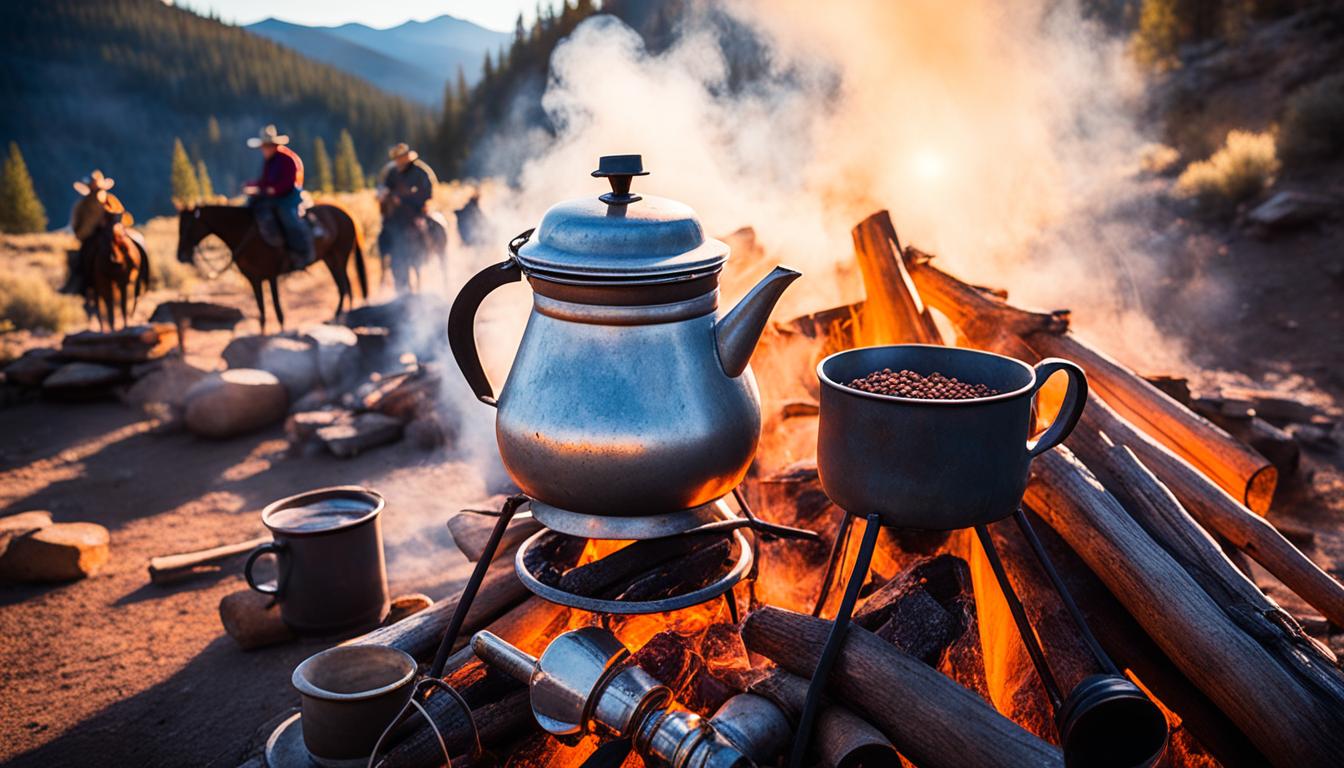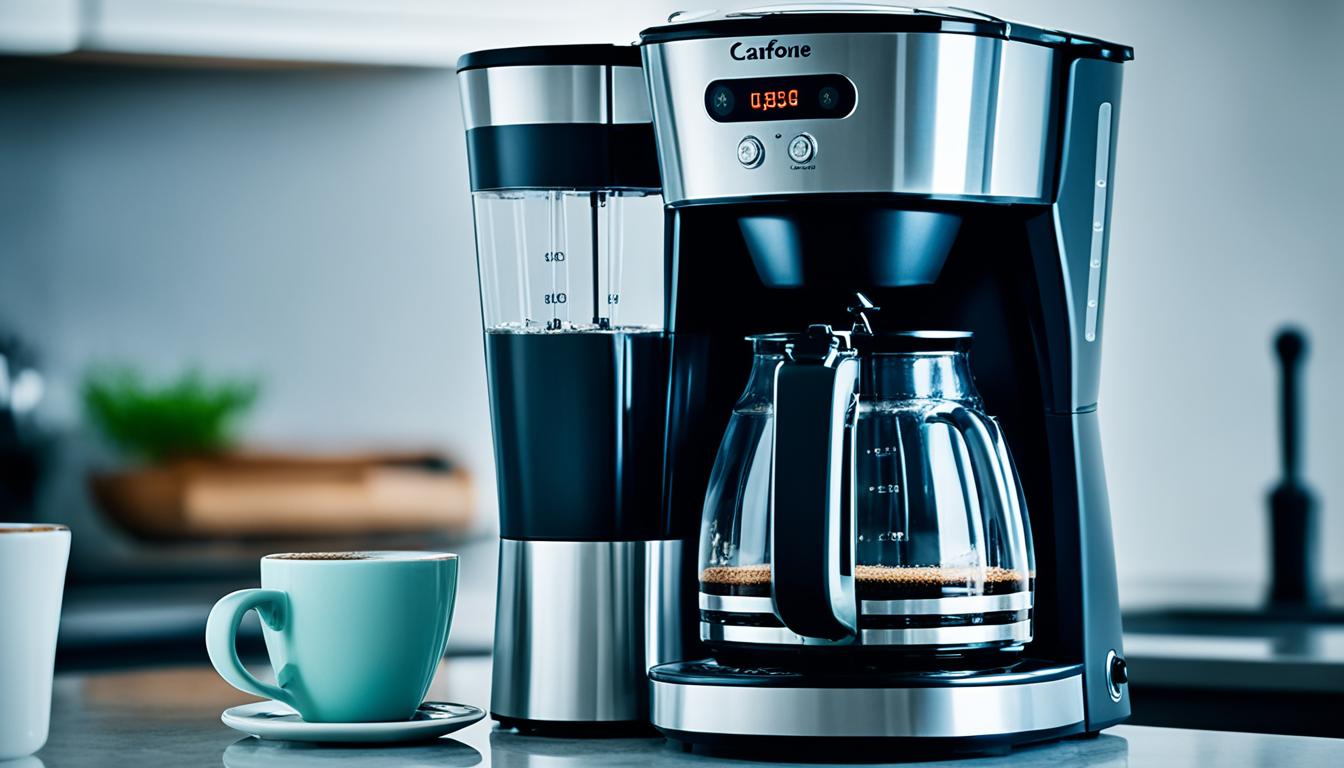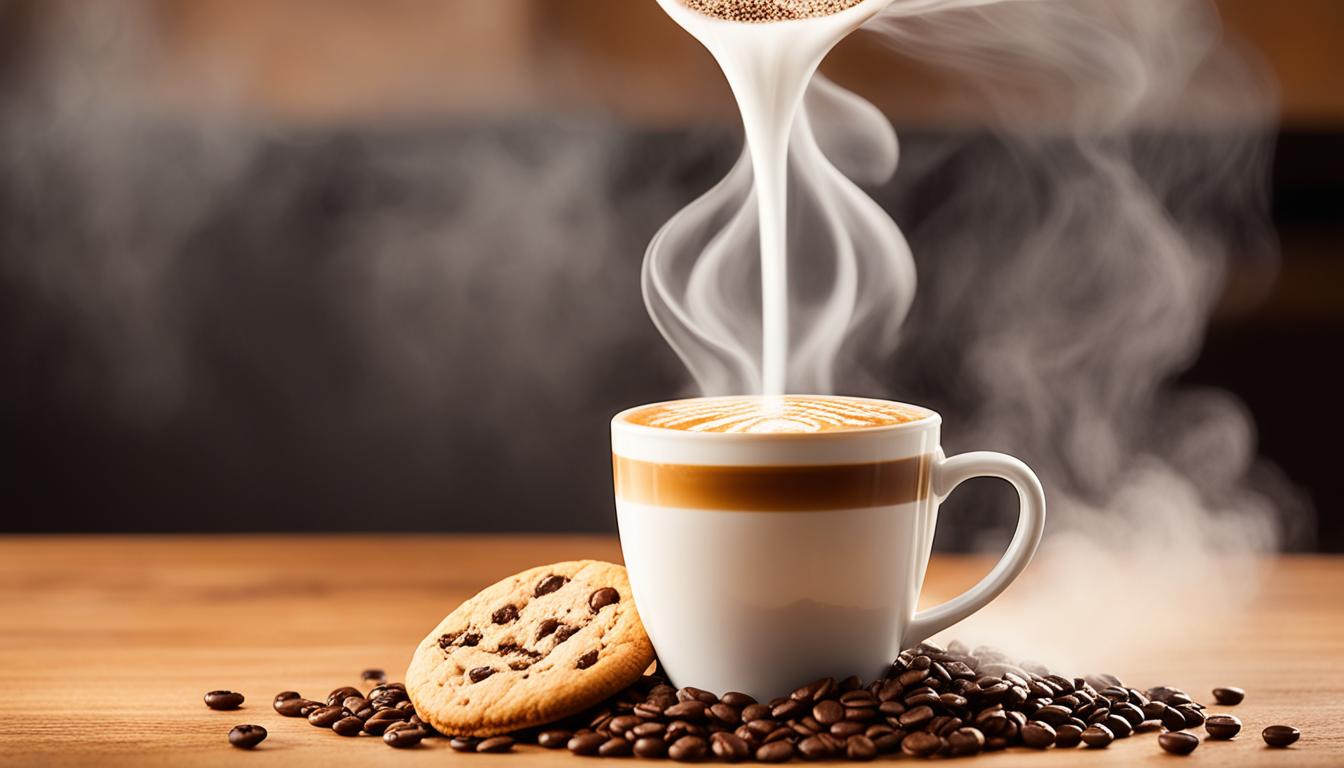Ever thought about how cowboys made their coffee out on the open range? It’s a brewing method wrapped in mystery, conjuring up visions of tough cowboys gathered around a campfire, enjoying a mug of bold, tasty coffee. But how did they actually brew it? And what made cowboy coffee stand out so much?
Cowboy coffee is a traditional brewing method that has a rich history. It was popularized by cowboys on the trail, who relied on this simple technique to fuel their long days on horseback. To make cowboy coffee, coarse coffee grounds are heated with water in a large pot, allowing the grounds to settle before pouring the coffee into a cup. This process may seem basic, but it creates a robust and bold flavor that cowboys cherished.
So, what sets cowboy coffee apart from other brewing methods? Why did cowboys choose this method over others? And how can we recreate this piece of history in our own homes or on camping trips? In this article, we’ll explore the fascinating world of cowboy coffee and learn how to make this traditional drink for ourselves.
Key Takeaways:
- Cowboy coffee is a traditional method of brewing coffee popularized by cowboys on the trail.
- It involves heating coarse grounds with water and allowing the grounds to settle before pouring the coffee into a cup.
- Cowboy coffee is celebrated for its simplicity and bold flavor.
- Cowboys relied on this brewing method during their long days on the range.
- Recreating cowboy coffee allows us to experience a piece of history and enjoy a unique flavor profile.
What is Cowboy Coffee?
Cowboy coffee is a brewing method that transforms coffee beans into a rich and flavorful beverage. This traditional drink has gained popularity in recent years, captivating coffee enthusiasts with its simplicity and evocative history. Despite being considered a last-resort option, cowboy coffee can surprise even the most discerning palate with its gourmet qualities.
The appeal of cowboy coffee lies in its brewing process. Rather than relying on modern coffee makers or intricate brewing techniques, this method embraces simplicity. To brew cowboy coffee, coarse coffee grounds are combined with water and heated, allowing the flavors to infuse. The key is to allow the grounds to settle naturally before pouring the coffee into a cup, ensuring a bold and robust taste.
This brewing method has become a symbol of the Wild West and the American cowboy lifestyle. It exudes nostalgia and a sense of rugged adventure, transporting coffee lovers back to a time when life was less hurried. Cowboy coffee has a distinct charm that cannot be replicated by more conventional brewing methods.
“Cowboy coffee celebrates the spirit of tradition and simplicity, offering a unique brewing experience that embodies the essence of the Old West.” Bethia – The Visionary Designer
The Maverick Flavors of Cowboy Coffee
What sets cowboy coffee apart from other brewing methods is its bold and flavorful profile. The coarse coffee grounds used in this method allow for a more extended extraction period, resulting in a stronger brew. The lack of filters also adds a touch of grittiness, delivering a unique texture that enhances the overall experience.
Whether prepared over an open flame during a camping trip or in the comfort of one’s kitchen, cowboy coffee offers a robust and satisfying flavor that can be enjoyed by coffee connoisseurs and casual enthusiasts alike. Its simplicity doesn’t compromise on taste, showcasing the true potential of the humble coffee bean.
The Allure of Tradition
The cowboy coffee tradition runs deep in American history, with its roots firmly planted in the 19th-century cowboy culture. Coffee was a beverage of choice for cowboys as they worked tirelessly on the range, providing them with the caffeine boost they needed to stay alert throughout long days of herding cattle and tending to their duties.
Cowboy coffee wasn’t just a means to an end; it represented community and a sense of home for cowboys on the trail. Brewed in large iron pots over open flames, the aroma of coffee wafted through cowboy camps and chuckwagon meals, bringing comfort and companionship to those far from their homes.
The Continuing Legacy of Cowboy Coffee
Today, cowboy coffee continues to captivate coffee enthusiasts and outdoor adventurers alike. Its tradition persists as a testament to the resilience and resourcefulness of the American cowboy. The brewing method has evolved to become an integral part of camping trips and outdoor excursions, where the simplicity of cowboy coffee aligns perfectly with the spirit of exploration.
By brewing coffee the cowboy way, individuals can connect with the past, experience the allure of tradition, and savor the rich flavors that embody the cowboy spirit.
How to Make Cowboy Coffee
Making cowboy coffee is a straightforward process that combines the rustic charm of the Old West with the rich flavors of a traditional brew. Follow this simple recipe to experience the bold and robust taste of cowboy coffee:
Ingredients:
- Water
- Coarsely ground coffee
- Optional: crushed eggshells
Instructions:
- Fill a large pot with water, allowing about one cup of water per serving of coffee.
- Place the pot over a heat source, such as a campfire or stove, and bring the water to a boil.
- Add the coarsely ground coffee to the boiling water, using approximately two tablespoons of coffee for every six ounces of water.
- Allow the coffee to steep for about five minutes, or longer if you prefer a stronger flavor.
- Optional: If you want to help the coffee grounds settle to the bottom of the pot more quickly, add a small handful of crushed eggshells to the mixture.
- Remove the pot from the heat and let it sit for a couple of minutes to allow the grounds to settle.
- Carefully pour the coffee into cups or mugs, using caution to avoid pouring the sediment from the bottom of the pot.
- Enjoy your freshly brewed cowboy coffee!
This brewing method creates a bold and flavorful coffee that complements the rugged outdoors or adds a touch of nostalgia to your morning routine. The simplicity of cowboy coffee allows you to enjoy a traditional drink even when traditional coffee makers aren’t readily available.
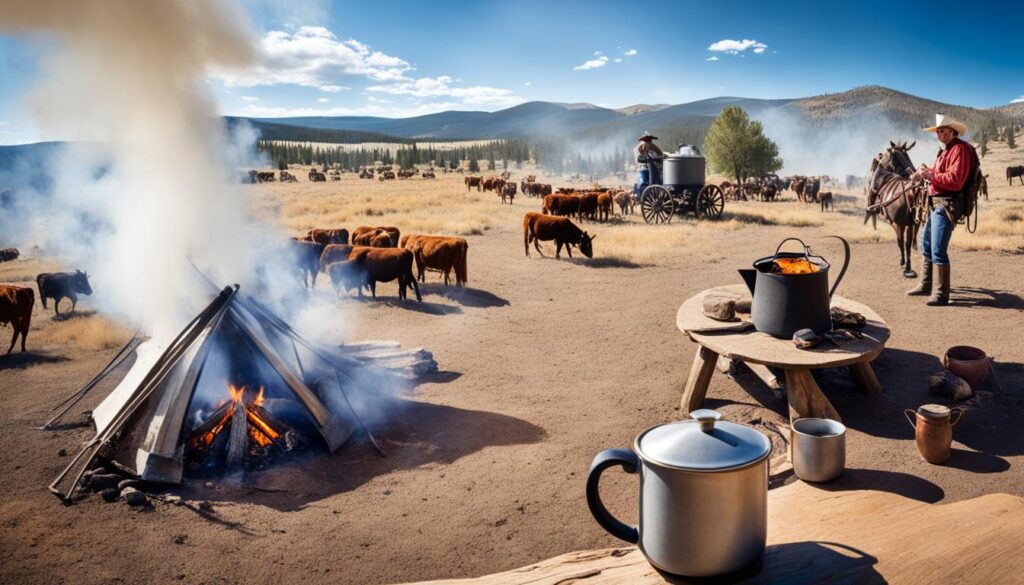
Cowboy coffee is a favorite among outdoor enthusiasts, campers, and coffee lovers looking to try something new. Its rich history and traditional brewing method make it an iconic part of American culture, evoking the spirit of the Old West. So grab your pot, fire up the heat source, and brew yourself a cup of bold and flavorful cowboy coffee.
The Cowboy Coffee Tradition
Cowboy coffee has a long and storied history in America, dating back to the time of American cowboys in the 19th century. Coffee became the beverage of choice for cowboys during their long days on the range, providing them with a much-needed dose of caffeine and helping them stay alert.
Cowboy coffee was often brewed in large iron pots over an open flame, creating a strong and slightly gritty brew. The cowboys relied on this method because it was practical and easy to do while they were out on the trail. The process involved boiling water, adding coffee grounds, and allowing the mixture to steep before pouring.
“Cowboy coffee was an integral part of cowboy camps and chuckwagon meals. It was more than just a cup of coffee; it fostered community and provided a comforting sense of home on the trail.” Noah, the Editor-in-Chief at Cappuccino Oracle
The traditional cowboy camps and chuckwagon meals were gathering places for cowboys to rest, eat, and socialize. These meals consisted of simple yet hearty dishes prepared over an open fire. Cowboy coffee played an essential role in these communal meals, bringing warmth and a sense of familiarity to the cowboys’ rugged lives on the range.
Chuckwagon Meals and Cowboy Coffee
The chuckwagon was the mobile kitchen that accompanied the cowboys on their journeys. It carried essential provisions and cooking equipment, including the large iron pots used to make coffee. Chuckwagon meals were a highlight of the day for the cowboys, and they would eagerly gather around the campfire for a hearty meal and a steaming cup of cowboy coffee.
The chuckwagon cook, also known as the “cookie,” was responsible for preparing meals for the hungry cowboys. The cookie knew the importance of a good cup of coffee to start the day right and keep the cowboys energized, so cowboy coffee was always on the menu. It became a symbol of comfort and companionship during their long journeys across the prairies and canyons of the American West.
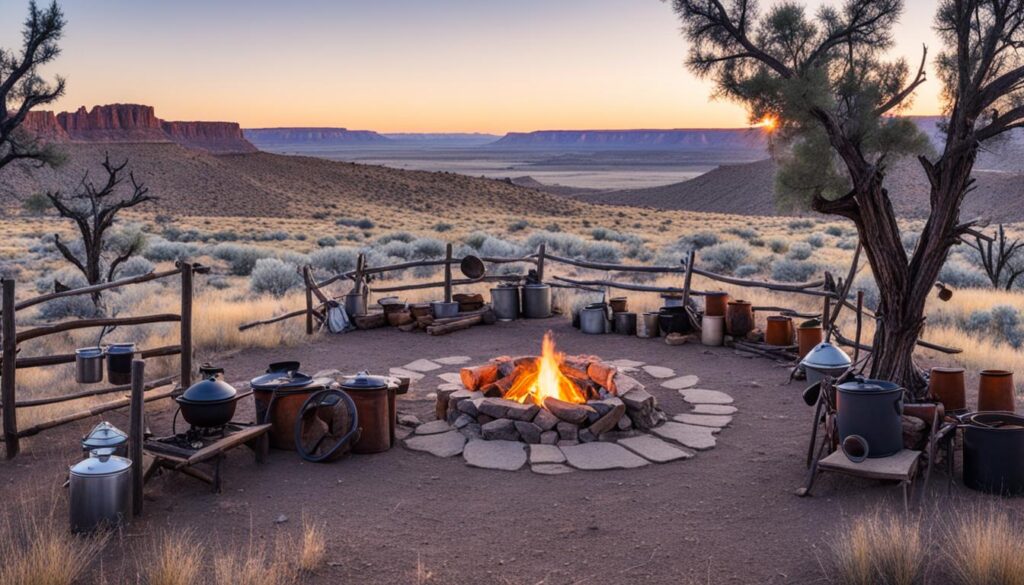
Coffee’s Role in Cowboy Culture
Coffee became deeply ingrained in cowboy culture and continues to be associated with the spirit of the American West. It represented the resilience and resourcefulness of the cowboys as they navigated life on the range. The brewing of cowboy coffee, with its rich aroma and strong flavor, has become a symbol of tradition and simplicity, attracting coffee lovers and enthusiasts to experience a taste of the Old West.
| Coffee History | American Cowboys | Cowboy Camps | Chuckwagon Meals |
|---|---|---|---|
| The use of coffee dates back centuries and has evolved into a global phenomenon. | American cowboys relied on coffee for energy and camaraderie during their time on the range. | Cowboy camps were gathering places where cowboys rested and socialized, often sharing meals and coffee. | Chuckwagon meals were a vital part of cowboy life, with cowboy coffee being an essential beverage. |
Cowboy coffee, with its history, tradition, and cultural significance, continues to be celebrated and enjoyed by coffee enthusiasts today. It serves as a reminder of the ruggedness and camaraderie of the American pioneers who roamed the vast landscapes of the West.
Make Coffee Like a Cowboy
To brew coffee like a cowboy, you don’t need fancy equipment or complicated brewing methods. Instead, you can embrace the simplicity of the traditional cowboy coffee brewing method, which has been passed down through generations. This brewing technique is perfect for camping trips and outdoor adventures, where a campfire coffee pot and minimal equipment are all you need to enjoy a steaming cup of cowboy coffee.
The process begins with gathering your essentials: a large pot, water, and coffee grounds. Fill the pot with water and bring it to a rolling boil over a campfire or stove. Once the water reaches boiling point, add the coffee grounds to the pot. The amount of coffee grounds will depend on your desired strength, but a good starting point is roughly 1 tablespoon of coarsely ground coffee per cup of water.
Allow the coffee to steep for a few minutes, allowing the flavors to infuse into the water. This step is essential for achieving the bold and robust flavor characteristic of cowboy coffee. As the coffee steeps, the grounds will settle to the bottom of the pot.
Voila! With a gentle pour, you can now enjoy a cup of rich and flavorful cowboy coffee. Remember to pour slowly to avoid disturbing the settled grounds. The result is a strong and full-bodied brew that will awaken your senses and power you through your outdoor adventures.
Part of the charm of making coffee like a cowboy is embracing the rustic nature of the brewing process. It’s a reminder of the resourcefulness and resilience of the cowboys who relied on this method to fuel their long days on the range. So, next time you find yourself in the great outdoors longing for a hot cup of joe, grab your campfire coffee pot and brew coffee like a true cowboy.
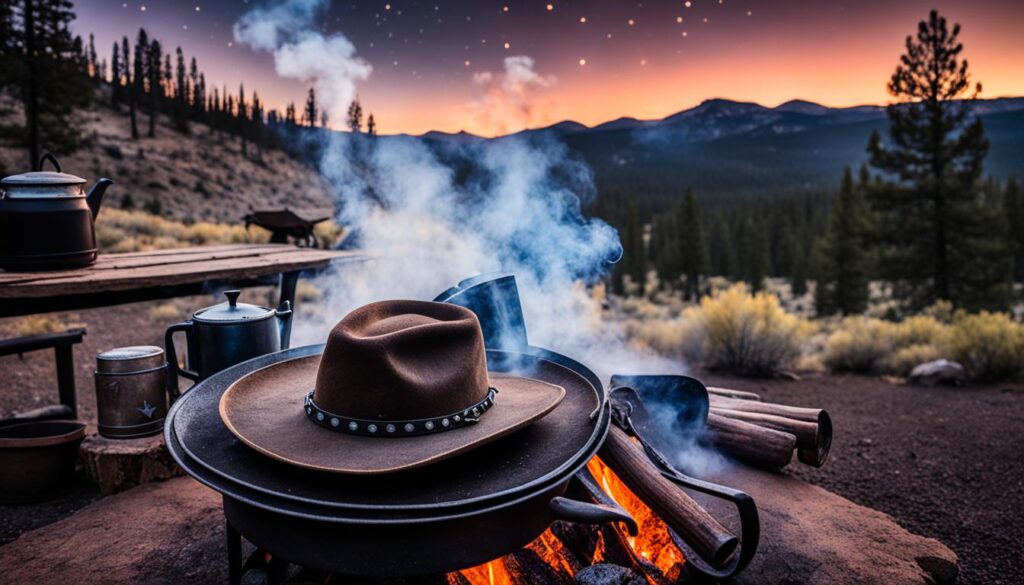
Why Use the Cowboy Coffee Brewing Method?
The cowboy coffee brewing method offers several advantages for outdoor enthusiasts and coffee lovers alike. Firstly, it requires minimal equipment, making it ideal for camping trips or situations where traditional coffee makers may not be available. All you need is a heat source, a pot, and coffee grounds.
Additionally, the simplicity of the brewing process allows you to appreciate the purity and boldness of the coffee flavors. The lack of filters or intricate brewing methods allows the natural oils and flavors of the coffee to shine through, resulting in a cup of coffee that is full-bodied and rich in taste. It’s like savoring a piece of history with every sip.
| Benefits of Cowboy Coffee Brewing |
|---|
| Minimal equipment required |
| Full-bodied and bold flavor |
| Simple brewing process |
| Perfect for camping and outdoor adventures |
| A taste of tradition and nostalgia |
The cowboy coffee brewing method not only provides a delicious cup of coffee but also connects you to a longstanding tradition. It’s a way to pay homage to the cowboys who relied on this brewing method to start their days on the range. So, grab your campfire coffee pot, embrace the simplicity of the brewing process, and enjoy a cup of coffee that resonates with the spirit of the Wild West.
Conclusion
Cowboy coffee, with its rich history and bold flavor, remains a cherished tradition that evokes a sense of adventure and the ruggedness of the Old West. While it may not be the most common brewing method in today’s coffee culture, it holds a special place in the hearts of those who appreciate its unique charm.
Whether you find yourself out on the range or exploring the great outdoors on a camping trip, brewing a pot of cowboy coffee can transport you back in time and provide a taste of the Wild West. The simplicity of this brewing method, combined with the nostalgic traditions it represents, offers a delightful way to enhance your outdoor adventures.
Experience the allure of cowboy coffee for yourself and savor the rich heritage and flavors it brings. Embrace the cowboy coffee tradition and enjoy the authenticity it offers, adding a touch of excitement and authenticity to your coffee brewing rituals.
